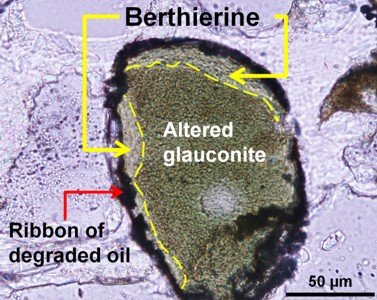Organic-Inorganic Interactions at Oil-Water Contacts

Background
Organic-inorganic interactions in sedimentary basins are well-known phenomena. One process which may cause organic-inorganic interactions is oil degradation which has affected many oil fields. The oil-water contact (OWC, actually an oil-water transition zone) is regarded as the main reactive site where anaerobic oil degradation takes place. In general, biodegradation rates in reservoirs decrease not only with increasing reservoir temperature and reach an assumed pasteurization temperature at approximately 80°C, but also decrease with increasing total dissolved solid content in formation water. The reaction pathways, responsible for the stepwise oxidation of, e.g., aqueous n-alkanes at OWCs lead to the formation of CO2, CH4, H2, and acetic acid. The process was termed “hydrolytic disproportionation” and is based on the concept of a metastable equilibrium between organic material, rock, and pore water. The actual processes were defined as reactions of hydrocarbons of a given oxidation state with water to produce organic species having higher and lower oxidation states of carbon. The products of oil degradation such as CO2, CH4, H2 (and acetic acid) may activate and control complex inorganic geochemical reactions: they can lead to the dissolution of primary and the precipitation of secondary minerals. However, the processes caused by oil degradation are highly complex and interacting dependent on the degree of degradation and thermodynamic stability of reservoir rock mineralogy. CO2, e.g., is moderately soluble (CO2(aq)) and reactive in aqueous solutions. CO2(aq) may be involved in H+ transfers and electron-transfer reactions, leading to dissolution or precipitation of mineral phases and to formation of a multicomponent gas phase. Massive CO2(aq) supply may control the sequential dissolution of different feldspar types and concurrent kaolinite precipitation.
Goals
- Reactivity of glauconite-bearing reservoir rocks on different degrees of oil alteration
- Investigation of CO2 vs. CH4 as major controls of glauconite alteration
- Feasibility studies to test quantitative calculations of products of oil alteration, e.g., berthierine, carbonate, etc.
- Investigations of oil alteration intensity on albitization
Participants
- PD Dr. Hans-Martin Schulz
- Nana Mu (MSc in Geology)
- Yannick Steinmann (MSc student)
Partners
- Prof. Dr. rer. nat. Wolfgang van Berk (University of Clausthal)
- Dr. Yunjiao Fu, Dr. R. Wirth, Dr. R. Naumann, Dr. D. Rhede (all GFZ)
- DONG Energy, GEUS, BGS
Funding
- Chinese Scholarship Council (CSC)


